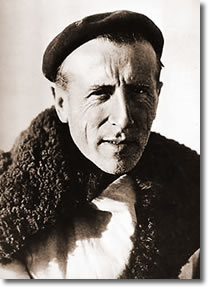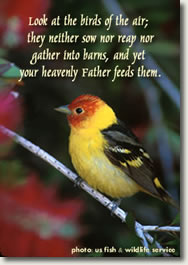Pierre Teilhard de Chardin
1881-1955
Jesuit, Paleontologist, Biologist,
Philosopher, Visionary
Then God said, " Let there be …"
—Genesis 1:3
 “Let there be ….” I
can still remember an incident that
occurred when I was in the first grade, or
maybe even kindergarten. On
the playground one day, one of my classmates said
that she had been
told that the world was coming to an end. That terrified me. The moment I got
home I burst into tears, telling my
mother all about this awful thing I
had just learned.
“Let there be ….” I
can still remember an incident that
occurred when I was in the first grade, or
maybe even kindergarten. On
the playground one day, one of my classmates said
that she had been
told that the world was coming to an end. That terrified me. The moment I got
home I burst into tears, telling my
mother all about this awful thing I
had just learned.
She tried to calm me, telling me that no one could know that kind of thing for certain and that, besides, the earth and all creation beyond it were very strong and very durable. That didn’t satisfy. So finally she took out the family Bible, trying to find a way to quiet my fears. As I recall, this is what she read to me:
…the Lord said in his heart,
“I will never again curse the ground because of man, …neither will I ever again destroy every living creature
as I have done.”
—Genesis 8:21
Slowly then, with
this assurance, my fears withdrew. Between the
truth of the Bible and the truth
of my friend, the Bible won. My friend
had been mistaken.
Yet now,
another kind of fear has begun taunt
me. I don’t think that God will destroy the
earth, but I can’t help but
wonder if we, the people whom God sent out to care
for the earth, will
destroy it instead.
Scientists say that the earth began to form over 4.5 billion years ago, that various gasses and interstellar dust worked together to form our sun and the rest of our solar system. Then later, between 3.8 and 4.1 billion years ago, the earth became a planet, with a nascent atmosphere and ocean. 1
Our human minds can scarcely even begin to comprehend such a length of time, or to imagine the various stages or levels of formation that the earth went through in becoming what we know it to be today. Yet what we can imagine—in fact, what we are beginning to realize with a frightening certainty—is that, although we are not able create matter or any new piece of the earth, we can do it great harm. And in so doing, we would harm as well all the life that this mother earth sustains. That which took so many billions of years to create, we, the earth’s “superior beings,” could ruin more quickly than we dare to believe. And alas, it seems that we have already begun to do just that.
Yet God said, “Let there be…”
0n May 1, 1881, in a rugged part of France, with views of volcanoes, hills and mountains, a child was born and given the name of Pierre Teilhard de Chardin. As he grew, he took great pleasure in the countryside around him —plants and animals, birds and butterflies, minerals and rocks, thus developing in his early years what he later called “a ‘phylum of love’ within nature”. 2
Yet even as he explored these natural wonders of nature, it was clear that he preferred those that were hard and durable—stones or shells or rock outcrops. Oftentimes he would seek out a secret place, as children do. And it was there, he later said, that “I withdrew into the contemplation of my ‘God of Iron.’” 3
As it turned out, his dominant focus was on these two things— a profound love of God, and a profound love of the natural elements of the earth in and through which he perceived God. This dual focus would continue to interest and shape him throughout his life. Thus as a grown man, it was no surprise that he became both a geologist and a Jesuit priest. 4 These two passions, these two commitments had been forged when he was but a child, in the very depths of his soul.
One can see them both in his book, The Divine Milieu. On a front page of the book is this dedication:
SIC DEUS DILEXIT MUNDUM
For those who love the world
The following excerpts from The Divine Milieu seem to call out to us with a certain urgency, even across the decades. Read them slowly and reflect on their truth and significance for today. Through these five quotations, you can experience for yourselves the depth of Chardin’s thought and the beauty of his writing. You will also be able to perceive how profoundly he believed that the earth, and all that fills and surrounds it, is crafted, imbued and sustained by God.
I invite you to spend some quiet time considering the insights expressed in each quotation. I believe you will see that, in this current time, you and I and all humanity are the ones charged with the responsibility (and I believe it is an urgent responsibility) of healing, protecting and maintaining this Divine Milieu in which we live. You and I are being called to care for God’s creation in our day, called to protect, restore and repair those three basic elements on which all life depends: the earth, the waters, and the air that surrounds us.
To do so is not only a civic or a human responsibility; it is also a service to God.
At the heart of our universe,
each soul exists for God, in our Lord.
But all reality, even material reality,
around each one of us,
exists for our souls.
Hence, all sensible reality, around each one us,
exists, through our souls, for God in our Lord. 5
This syllogism can help us understand more clearly the relationship that Chardin perceived between material and spiritual reality. Consider each statement separately. Then see how they fit together and produce the bold conclusion that Chardin perceived so clearly. In this process, it is interesting to recall that the Old Testament book of Genesis proclaims much the same wonder, not as a syllogism but as a discovery of truth.
As Jacob said, awakening from his dream,
the world, this palpable world…
is in truth a holy place, and we did not know it.
Venite, adoremus.”
—Genesis 28:16
…by virtue of the Creation and, still more,
of the Incarnation,
nothing here below is profane
for those who know how to see. 6
Do you know how to see? How to gaze with awe into a clear, nighttime sky? Or how to notice the fragile courage of the first crocus? Or to wonder at the symmetry of a snowflake or the complexity of a new-born child? Not one of these is profane—each has an aura of the sacred. This palpable world is indeed a holy place.
Chardin’s statement above invites us, no, urges us to be always alert to everything that surrounds us, and then to go still further, to acknowledge that everything on this earth is a part of God’s creation.
Learning to see in this way is central to an understanding of God’s concern for the earth and the life that it sustains. Destroy it? No—Venite adoremus. Come, let us protect it, restore and adore it.
To do otherwise becomes a sacrilege before God, and a catastrophe for humanity.
The day is not far distant when humanity will realize
that biologically it is faced with a choice
between suicide and adoration. 7
Chardin believes that we are constantly confronted
by choice—choices about our commitment to God and thus to the earth.
We can choose to see or to remain blind, to love or be
indifferent, to protect or to destroy. Consider the urgency he felt,
even over a
century ago: The choice expressed in this way is still an
urgent wake-up call!
Either we proclaim our love for the earth through
our actions of honoring,
nurturing and protecting her—much as a grown
child would protect and care for a
beloved elderly parent—or we ignore,
rape and corrupt her, using her bounty to
meet our needs of the moment
and disregarding the eventually irredeemable
damages we may
inflict.
Consider, also, that the particular
characteristic that
identifies us as a human being is our ability to reason and
to choose.
Yet, still, it seems that we often act only reflexively, that we fail
to stop and recognize the immediate or long-term effects of our choices
and
actions. We need to think before we act, to be purposeful and
prayerful.
Far too many Christians are insufficiently conscious
of the divine responsibilities of their lives, and live like other men, giving only half of themselves, never
experiencing the spur or the intoxication of advancing
God’s kingdom in every domain of mankind. 8
Embedded
in Chardin’s understanding of human life and
human responsibility is a sense of
profound sorrow as he recognizes how
humanity’s failure to act diminishes the
vitality and fullness of our
lives.
Focus for a moment on your “divine
responsibilities.”
Consider first that the word responsibility itself is
something that
one does, or must do, in response—response to a need, a request,
a
situation or to God. So, to care for child, to plant a tree, to cultivate a
garden, even to dispose of waste materials properly, is to honor and
respond to
God. All that we do, we can do in order to “advance God’s
kingdom,” even in our
own town or our own backyard.
…by virtue of the Creation and, still more,
of the Incarnation,
nothing here below is profane
for those who know how to see. 9
This statement offers us a critical link in understanding Chardin’s thoughts. It can even be phrased as if it were a formula of logic:
- That all physical, material substances of the universe were created by God,
- That God also became a living human person in Jesus,
- Thus, all matter was blessed through this Incarnation of God’s becoming, in Christ, a physical, living being.
Perhaps, we fail to consider how closely these two events are bound
together, the creation and the incarnation. Yet clearly, the
relationship of the
two was of profound significance to
Chardin.
As we each go through our
daily work and activities, we
would indeed be wonderfully enriched if we stop to
recall that this
earthly habitat, this earthly home, is sacred—to remember that
whatever
we do, whether we care for the earth or spoil it, at the same time, we
honor or dishonor God.
Matter and spirit are two distinct
aspects of one
single cosmic stuff. So who are we, then, to consume or
corrupt, to pollute or
poison the very elements that life depends on?
The very gifts that God has
provided for us? We are not to abandon or
ignore this “palpable” world, but to
protect, restore and care for it,
to recognize that it is irreplaceable.
©2007 Margaret Gunness.
Photograph of Teilhard de Chardin courtesy of the Fondation Teilhard de Chardin.
NOTES
1. Earth’s Beginnings: The Origins of Life by Eric McLamb
2. The Divine Milieu, New York & Evanston: Harper Torch Books, Harper & Row, 1960. Forward: “Teilhard de Chardin: The Man” by Pierre LeRoy, SSJE, p. 13.
3. Ibid, pp. 17 -18.
4. Ibid, p.19
5. Ibid, p.21-22
6. The Divine Milieu, p.112
7. Ibid, p.66
8. The Divine Milieu Forward, p.40-41
9. The Divine Milieu, p.69

